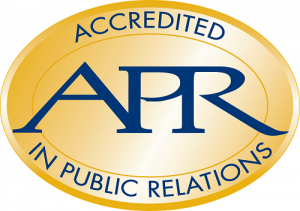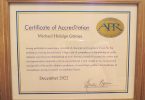
It’s been 28 years since I took the Examination for Accreditation in Public Relations with about as much anxiety as one individual could have had going into that testing area. We did it on typewriters in my day. But the exercise in assessing your body of knowledge of this vast profession has remained constant whether typed or through today’s technology. For that I am grateful, because that means APR stands for something.
What is that you ask? Well, honestly, it’s probably different for every person. We all have differing reasons for obtaining the credential. I had mentors’ thumbs on my forehead that said, “Get it done.” So I did — while pregnant and chasing a toddler. What was I thinking? I had just started my consulting business and thought it would give me credibility.
I wasn’t sure I mustered the same level of skill as my esteemed agency peers. I didn’t work for a large corporation with big budgets and grand campaigns. I survived the rigorous oral review of my day by a panel of pros that knew me well. They left no ethical “how would you handle …” stone unturned. They put me through my paces and challenged me. I discovered I had as solid and broad-based an understanding of PR as anyone. And sometimes more than many of the 21 (yes, there were 21 in my class!) candidates with whom I was sharing this adventure. They were specialists. I was a generalist. I affirmed I could execute at a high level right along with those peers I admired so greatly.
So why get your APR? Because I said so. No, wait, that’s an answer reserved for my children. The real answer: to further your leadership ability. That’s where we have great value in business — by leading strategically — and the APR helps you do that. Getting the APR elevated my thinking and ability to look at the work I do. The APR process gives you time to take pause upon your career, what you have learned and how you apply that knowledge. Now you can bring it all together and stretch it even further so you have even more to offer clients, management, customers and fellow employees.
I’ve always looked at those three letters as an opportunity to educate. They are a conversation starter. What’s the APR mean after your name? Well, it isn’t abdominoperineal resection; I’m not a doctor. It doesn’t stand for annual percentage rate; I’m not a loan provider. It doesn’t stand for approach; I’m not a pilot. It doesn’t stand for American Public Radio; although I work with the media on occasion. It just takes a smile and a wink and then I have the chance to talk about PR and the level of strategic thinking, problem solving and expertise a PR pro brings to the table.
For me, APR stands for a level of understanding and commitment to my profession. I’m glad I had a nudge or two to challenge myself with this process. I discovered a lot about myself, my perspectives, others’ insights and affirmed I can perform with the best. For a young pro, sometimes that means more than anything. As a seasoned professional (I like to think I’m cayenne pepper!), I know the process helped me be more strategic, to think more broadly, to trust my instincts and to affirm my ethical practices. For those reasons and more, I bear those letters proudly after my name and always will.
For more information about getting your Accreditation in Public Relations, visit here.
Jane Dvorak, APR, Fellow PRSA, is the 2017 National chair and attributes her APR success to her Coors study group, who adopted her into their special study sessions so long as she brought her baby along for cuddle time. The rest is history.






